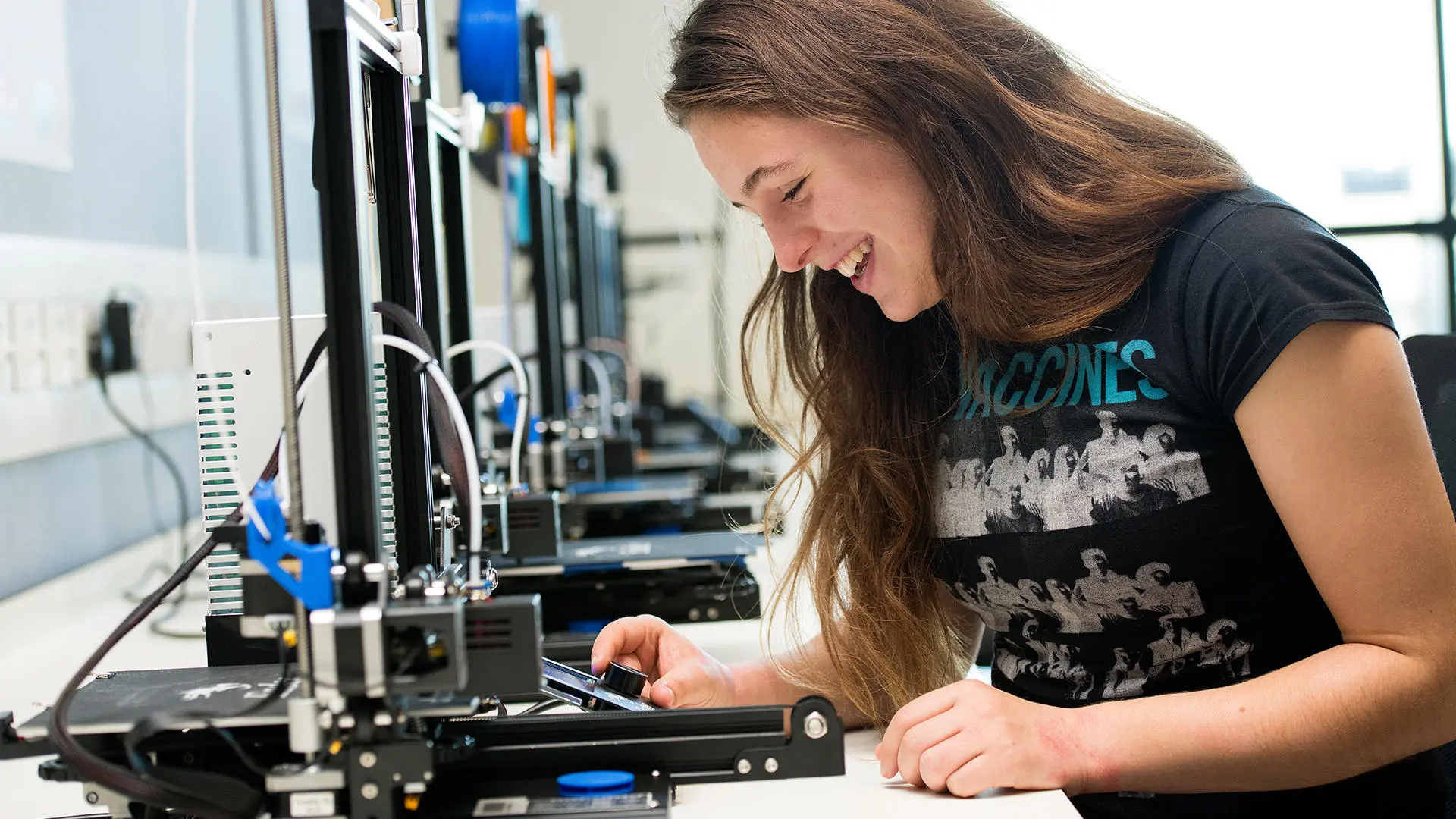Additive Manufacturing, or 3D printing, is an exciting new field using diverse technologies for equally diverse applications. It’s now possible to print everything from aerospace parts to biological tissue and even houses.
Why study with us
- Located within one of the most intense engineering and manufacturing areas in the UK, our £35m Engineering Innovation Centre provides an integrated space for teaching, research and work on live, real-world projects with commercial partners.
- Access world-class facilities in additive manufacturing, materials testing, tribology and computer-aided engineering, including the University’s Additive Manufacturing and Materials Testing labs, engineering and CNC workshops, a metals and 3D workshop, and a rapid prototyping suite.
- Learning will be largely project-based, with hands-on use of equipment and software. The course will include relevant industry visits, guest speakers and industry-related projects.
What you'll do
- You will get the chance to build your own 3D printer, allowing you to learn through experimentation, and to develop new or enhanced Additive Manufacturing technologies.
- Enhance your work experience through a 12 month professional placement that’s built into your MSc. Alternatively, choose a shorter industry-based work experience project.
- You may have the chance to travel internationally to participate in conferences and to publish in research publications.
Modules
Every effort has been made to ensure the accuracy of our published course information. However, our programmes are subject to ongoing review and development. Changing circumstances may cause alteration to, or the cancellation of, courses. Changes may be necessary to comply with the requirements of accrediting bodies or revisions to subject benchmarks statements. As well as to keep courses updated and contemporary, or as a result of student feedback. We reserve the right to make variations if we consider such action to be necessary or in the best interests of students.
Your teaching team
Our lecturing academics are active researchers in additive manufacturing and 3D printing. They specialise in metal, polymer and composite materials, advanced computer-aided design, 3D scanning, sustainability and product innovation.
Our staff are frequently published in sector-leading journals such as Additive Manufacturing. Academics collaborate with industry to implement cutting-edge technologies. They are also fellows of the higher education academy and members of accrediting bodies, such as the Institute of Mechanical Engineers (IMechE).
A specialist technician supports the additive manufacturing laboratory. They can help you get hands-on experience with our 3D printers and your project work.
Future careers in additive manufacturing
The additive manufacturing industry is predicted to grow by 21% annually between 2022-2030 (Cision PR Newswire). This evolving industry is revolutionising the sectors where it is being implemented. Such as construction, aerospace and MedTech.
Frequently asked questions
Entry requirements
- Entry can be made to the course through holding at least a lower second class award of BEng (Hons) or BSc (Hons) in Mechanical Engineering, Manufacturing Engineering, Materials Engineering, Product Design, Aerospace Engineering, Mechanical Engineering, Industrial Engineering, Motorsports Engineering, Energy Engineering, Maintenance Engineering, Mechatronics Engineering, Biomedical Engineering or Product Innovation
- Applications from individuals with non-standard qualifications or relevant work / life experience who can demonstrate the ability to cope with and benefit from Master-level studies are welcome
- Access qualifications should normally be in a Mechanical Engineering subject or a related area
- Students whose first language is not English will be required to demonstrate competence in the language. The normal minimum standard required is IELTS 6.0 with no individual component below 5.5 or equivalent.
Fees and funding
Scholarships and bursaries
We have a wide range of bursaries, scholarships and funds available to help support you whilst studying with us.
Select your country to see eligibility information and how to apply by selecting more info on the cards below.
Dependants Bursary
Students with financially dependent children may be eligible for our Dependants Bursary as part of our financial support package.
Find out more about Dependants BursaryCarers Bursary
If you need extra support because you have unpaid caring responsibilities alongside your studies.
Find out more about Carers BursarySports scholarships
We offer student athletes support and opportunities for their playing careers whilst they study a high-quality degree.
Find out more about Sports scholarshipsAlumni Loyalty Discount
UK students with a previous award from us will receive 20% tuition fee discount.
Find out more about Alumni Loyalty Discount
This course is delivered by the School of Engineering and Computing
For information on possible changes to course information, see our essential and important course information
You can find regulations and policies relating to student life at the University of Central Lancashire on our student contract page


